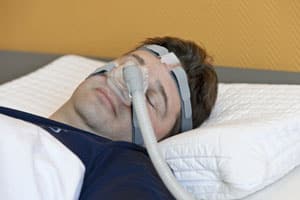
Worse yet, your sleep apnea specialist has prescribed the CPAP device for you. You’ve tried the continuous positive airway pressure machine and you can’t stand it. Night after night, you’re hooked up to a machine, wearing a mask, struggling with dry mouth. The noise is bothers you. You can’t get in a comfortable position. All in all, you feel like you get less sleep now. Take heart. There are alternatives.
1. Sleep Orthotics
If CPAP is bringing you down, speak to a sleep apnea dentist about a sleep orthotic. A sleep orthotic is a mouthpiece to treat sleep apnea that is a custom fit for you. It will involve wearing this mouthpiece every night when you go to bed. The concept is based on bringing your jaw into proper alignment and making sure that your tongue is held in the proper position, freeing your airway from obstruction. You’ll breathe easily during the night and no longer wake up gasping.
2. Orthodontic treatment
Because your jaw growths gradually, upper and lower jaws sometimes develop at different rates. Mismatched jaws can ?directly affect your breathing and could be what’s causing ?your sleep deficiency. Other jaw issues that can affect the shape of your jaw and cause malocclusion are:
People with these types of jaw problems may benefit from orthodontic treatment. Once your jaws are matched properly, you may find you are breathing better during sleep.
Could these CPAP alternatives work for you?
A sleep apnea dentist can help you to find answers to make your sleep apnea manageable. When CPAP, isn’t working, discuss your options with a sleep dentist. Together you can find a solution that will work for you.
